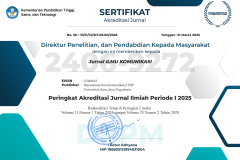Penggunaan Media Sosial oleh <i>Digital Native</i>
DOI:
https://doi.org/10.24002/jik.v15i1.1243Keywords:
Digital Media, Literacy, Education, Internet, Higher StudentsAbstract
The lack of digital media literacy education shall become requirement to the rises of horribly phenomenon in Indonesia. The purpose of this study is to create the awareness on using social media smartly. I used qualitative method that had been taken through purposive sampling. Since the Collaborative Learning Model of Digital Media Literacy was applied, students mindset about Digital Media Literacy meaning had shifted into the wiser social media users.
References
Alexander, Alison. Jarice Hanson and Simson Garfinkel. (2010). Mass Media and Society. McGraw Hill Companies, Inc: New York.
Baran, Stanley J. (2011). Introduction to Mass Communication: Media Literacy and Culture. McGraw Hill Companies, Inc: New York.
Brosdahl, D.J. and Carpenter, J.M. (2011), “Shopping orientations of US males: a generational cohort comparison”, Journal of Retailing and Consumer Services, Vol. 18, pp. 548-554.
Carpenter, C. J. (2012). Narcissism on Facebook: Self-promotional and anti-social behavior. Personality and Individual Differences, 52(4), 482486.
Dewdney, Andrew and Peter Ride. (2014). The New Media Handbook. Routledge, New York.
Hannah Gomez Farias, AnnPaskor dan WalterE.Block (Economics Department, Joseph A. Butt, S.J. College of Business, Loyola University New Orleans, New Orleans, Louisiana, USA) (2017)
Immordino-Yang, M.H., Christodoulou, J.A. and Singh, V. (2012), “Rest is not idleness: implications of the brain’s default mode for human development and education”, Perspectives on Psychological Science, Vol. 7 No. 4, pp. 352-364.
Michaël Opgenhaffen and An-Sofie Claeys (Institute for Media Studies, Faculty of Social Sciences, KU Leuven, Leuven, Belgium) (2017)
Naomi Amofah-Serwaa and Perpetua S. Dadzie. (Department of Information Studies, University of Ghana). (2015)
Pempek, T.A., Yermolayeva, Y.A. and Calvert, S.L. (2009), “College students’ social networking experiences on Facebook”, Journal of Applied Developmental Psychology, Vol. 30 No. 3, pp. 227-238.
Park, N., Kee, K.F. and Valenzuela, S. (2009), “Being immersed in social networking environment: Facebook groups, uses and gratifications, and social outcomes”, CyberPsychology & Behavior, Vol. 12 No. 6, pp. 729-733.
Renato Hübner Barcelos and Carlos Alberto Vargas Rossi (Management School, Federal University of Rio Grande do Sul, Porto Alegre, Brazil.) (2014)
Ruth N. Bolton, A. Parasuraman, Ankie Hoefnagels, Nanne Migchels, Sertan Kabadayi, Thorsten Gruber, Yuliya Komarova Loureiro and David Solnet (W.P. Carey School of Business, Arizona State University) (2017)
Supratman (2017). Remaja dan Kecerdasan Bermedia Sosial (Teenager and social media intelligency). Pikiran Rakyat tanggal 27 Juli 2017, Kamis,
Valkenburg, P.M., Peter, J. and Schouten, A.P. (2006), “Friend networking sites and their relationship to adolescents’ well-being and social self-esteem”, CyberPsychology & Behavior, Vol. 9 No. 5, p. 584.
Worley, Will (2017). US teenager's family say he died after taking part in 'Blue Whale' suicide game. Online Newspaper INDEPENDENT. Thursday, 13 Juli 2017.
Downloads
Published
How to Cite
Issue
Section
License
Jurnal ILMU KOMUNIKASI is an academic journal. As such, it is dedicated to the open exchange of information. For this reason, JIK is freely available to individuals and institutions. Authors who publish in Jurnal ILMU KOMUNIKASI will release their articles under the Creative Commons Attribution (BY) License. This license allows anyone to copy and redistribute the article in any medium or format as well as remix, transform, and build upon the material for any purpose, even commercially as long as they credit the authors for the original creation. For details of the rights authors grants users of their work, see the "human-readable summary" of the license, with a link to the full license. (Note that "you" refers to a user, not an author, in the summary)
 This work is licensed under a Creative Commons Attribution 4.0 International License.
This work is licensed under a Creative Commons Attribution 4.0 International License.














